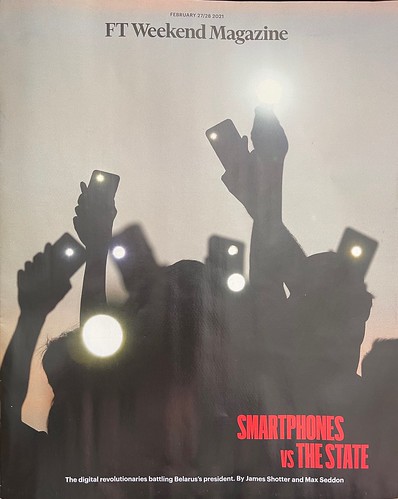Nexta
Nexta media operation and its role in the Belarus protests was the main article in this weekend’s FT magazine.
A few things about the article. The old maxim of ‘hearts and minds‘ is still true despite technology. Secondly, Belarus seems to view media and propaganda as a tactic rather than something strategic. This surprised me given that Belarus has always been authoritarian in nature and Soviet in terms of the way it operated. It is at odds with the way countries like Vietnam and China operate.
Finally, the irony that the smartphone is the instrument of protest. Nexta seem surprisingly well organised in a way that wasn’t seen with voices around the Hong Kong protests.
Most of the Belarussians will be using handsets based on technology from Google. Google doesn’t believe in privacy (apart from the privacy of its executives) and has a viewpoint of data that most authoritarian regimes would appreciate.
Old Hong Kong
YouTube has a lot of digitised archive footage. First up is unused footage shot in 1962 filmed for a Pathé film This is Hong Kong.
The next reel was shot six years later. Again it was footage that ended up on the cutting room floor of Pathé. The footage was shot for one of its Colour Pictorial episodes. These were film magazines that screened prior to the main feature film in a cinema. Television would be soon squeezing cinema as the main form of video based news and documentaries.
Some of this footage was familiar to me from my times going and living in Hong Kong, whilst other aspects of it were unrecognisable. Both of these films reminded me of Miroslav Sasek’s book This is Hong Kong.
Japan
This footage is said to be taken in Tokyo, Osaka and the countryside in Japan during the 1980s. Though the airplane through bamboo scaffolding footage from 0.23 – 0.25 seems to have been taken on the run in to Hong Kong’s old Kai Tak airport. Some of it is beautifully shot.
It is underpinned by a an ambient track that works really well.
Talking of Japan, ASICS have a shoes that reminds me of the bindings used to hold bamboo scaffolding together and the weaving of bamboo screens. Asics and a Japanese architect made a shoe inspired by bamboo weaving.
ASICS have put together a film to promote the shoe.
Berocca integration of radio and voice services
Finally Berocca did an innovative radio advert to take advantage of voice services as part of its radio advertising campaign. Alexa has a well documented API stack for building skills, which is what Berocca is encouraging consumers to use. I could see this happening more as Alexa is rolled out in automotive environments.

